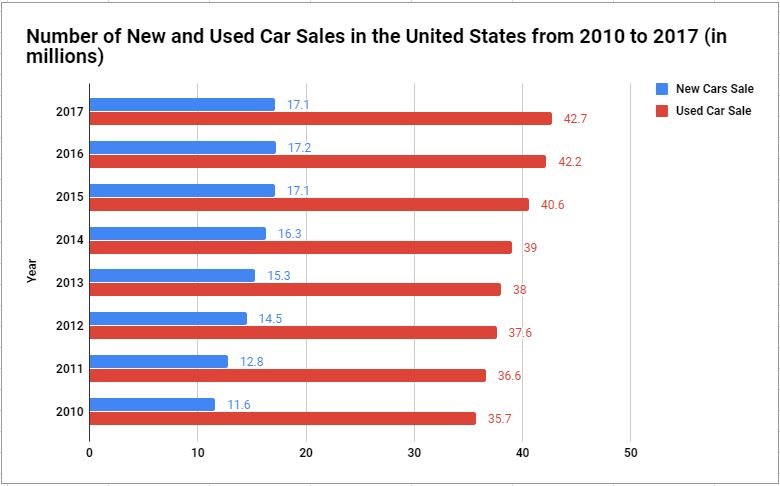Vehicle History Report is not less than a DNA report of a car. This single report can help in tracking the detailed history of a vehicle from the time it was manufactured until it ends up in your hand.
Looking at the US auto sales data from the year 2010 to 2017, a steady increase in the number of used cars was observed. The graph represents a comparison between the number of new and used car sales in the US (2010-2017).
It shows an upward trend in sales of used cars during the period. In 2017, 42.7 million used cars changed hands, and going by initial months, projected sales of used cars are estimated to be around 43.8 million by 2018.
Considering the high demand for used cars in the United States, it is essential to check the vehicle history report before finalizing that one car. Vehicle Check USA provides a detailed vehicle history report.
What is a Vehicle History Report?
A vehicle history report is an important part of your car buying research. This single report can save you a ton of money by letting you know about the specific details of a car and helping you prevent a bad buy.
Check & Decode Any VIN Instantly
Get your VIN check and find hidden problems with any car! Comprehensive vehicle and accident history, service and repair information, specifications, theft status and more

A vehicle history report covers the following information,
- Accident
- Other Damages
- Title Information
- Ownership
- Odometer Readings
- Service History
- Sales Information
- Registration and Inspection Information
- Recall
1)Accidents
The most important thing which a vehicle history report will tell you is whether there are reports that the car has been in an accident. VehicleCheckUSA procures data from multiple reliable sources, including NMVTIS, National Insurance Crime Bureau, collision repair facilities, law enforcement agencies and other reporting companies. All the reporting companies are able to put the data together to show the severity of the accident which a car has undergone. Airbag deployments are reported under major structural or frame damage.
The reports like accident record help in the better evaluation of the car during the time of pre-purchase mechanical inspection. You can instruct the mechanic for specific evaluation based on the details of your vehicle history report. You can check if the airbags were replaced, a close inspection can tell you if they are functional, or if they were recycled from another wrecked car.
2) Other Damages
Vehicle History Report will also indicate if the car has suffered other serious damages like fire or flood.
Both of these damages are reason enough to walk away from the deal. Mostly the cars that have undergone a flood or fire are unsafe for purchase. There is a high chance of hidden problems associated with these vehicles.
The Vehicle History Report also shows the details of a car stolen and recovered. You can find this detail by looking at the specific time on the report, such as the time that elapsed between when the car was stolen and recovered. Remember if a long time has elapsed, the car may also have to carry a salvage title.
3) Title Information
Title information is an important aspect of the Vehicle History Report. It not only tells you about the history of the title, but it also gives the detail of a vehicle’s title branding like salvage, rebuilt or junk.
A salvage title shows when an insurance company declares that the vehicle is a total loss and takes its possession, but still, the vehicle is repaired and returned to the road.
Typically, one should avoid the salvage title vehicle, as they are hard to finance, insure, potentially unsafe, and often expensive to maintain. Other vehicle titles are taxi cab use, fire manage, police use, hail damage, or if a car was bought back by a manufacturer under a state’s lemon law. Title brands differ between states and can sometimes be removed by moving a car to a state with fewer rules. For more details on salvage title please check the link: 5-things-you-should-know-about-a-salvage-title
4) Ownership
The vehicle history report also shows the entire ownership history. It will include the details like a vehicle was owned by a private individual, companies, rental agencies or fleet operators. Usually, a single privately owned car is more valuable compared to multi-owner used vehicles.
Also, check for lien information on the vehicle history report. Never buy a car until you have proof positive that any lien has been satisfied.
5) Odometer Readings
Never trust the odometer reading that you see on the dash of a used car. A vehicle history report will give you all the details on the accuracy of the odometer. Consider it as a red flag if you find a difference in the odometer reading between the report and the car. Though it is illegal, still, rolling back the odometer reading is a very common practice. The rolling back of an odometer is not simple at all but some unscrupulous sellers will swap out the entire instrument and replace it with a lower-mileage wrecked car to give the impression that the car that you are looking at has lower mileage than it does. VehicleCheckUSA also provides mileage record on the vehicle history report.
6) Service History
A comprehensive vehicle history report will give you the details of where and when the service of your chosen car was performed. It’s a well-known fact if a car is well- maintained it is more valuable than the one that isn’t. So, if the car you are purchasing lacks a detailed service history, be sure to inspect it during the pre-purchase mechanical inspection.
7) Sales Information
The vehicle history report will also show the first entered service of a vehicle. Note, if a vehicle bounces all over the country there are high chances that the vehicle is moving around to remove black marks from titles.
Many dealers move a car to mask certain types of vehicle damage. For example, cars flooded by hurricanes are often moved to parts of the country where flood damage might not be considered.
8) Registration and Inspection Information
The vehicle history report should show the details each time a car is registered, inspected, or renewed. Different states prioritize different inspection like an odometer, emissions, safety checks, or the status of any liens.
Always note the gap in registration status. A gap could indicate a time that a vehicle was abandoned, stolen, or undergoing any major reconstruction process.
9) Recalls
Mostly, every vehicle on the road seems to get recalled at some point. Either it is for emission control or critical safety issues that can get you into trouble.
The list of recalls on the report will help you know if any recalls have been performed on the vehicle and what all needs to be done.
Looking at the high demand for used cars and considering all the above points VehicleCheckUSA provides a vehicle history report which is comprehensive and easy to understand.
Check & Decode Any VIN Instantly
Get your VIN check and find hidden problems with any car! Comprehensive vehicle and accident history, service and repair information, specifications, theft status and more

Read also: 10 Points to Check in a Vehicle History Report

————————————————————————————————————————————————————————————————
Every used car has a back-end story and some of them are nothing short of a nightmare. So, always look for the Vehicle History Report before purchasing a used car. It will help you know if a car has a clean history or hidden problems. We have data available for every used car sold post-1982.

